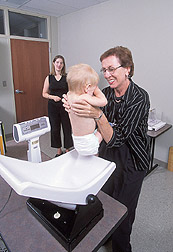This page has been archived and is being provided for reference purposes only. The page is no longer being updated, and therefore, links on the page may be invalid.
|
Read the magazine story to find out more. |
Scientists Study Soy Infant FormulaBy Jim CoreJanuary 6, 2004 The Arkansas Children's Nutrition Center (ACNC) in Little Rock, Ark., has been conducting a six-year study that began September 2002 to investigate the effects of soy-based infant formula compared with formulas made from human breast milk or cow's milk. The Agricultural Research Service, the U.S. Department of Agriculture's chief scientific research agency, is funding the research. Some researchers have reported that consuming soy-based formula could accelerate puberty and cause developmental and reproductive abnormalities and thyroid disorders later in life. Critics suggest that isoflavones in soy formula might disrupt or impair development in infants because it's believed they may act similarly to the female hormone estrogen. However, based on previous ACNC findings, Thomas M. Badger, ACNC director, suspects that soy isoflavones don't act like female hormones in infants. Previous studies at the center and elsewhere found no apparent long-term positive or negative effects of feeding infants soy versus cow's milk formula. In rat studies, Badger and his team found the animals grew and developed normally except for very minor differences that have not been found in humans. There were no adverse effects, but many healthful ones. They also found that diets containing soy proteins boost the activity of certain enzymes that help remove harmful toxins from the body. This can actually remove from the body substances that cause disease, such as cancer. However, the ACNC studies did show that soy consumption changed certain enzymes in the liver, gut and other organs that break down many medications taken by people and animals. That could affect how the drugs are used by the body. Researchers are further studying this by comparing infants who are fed soy formula with those who are breast fed or who receive cow's milk formula. Read more about this research in the January 2004 issue of Agricultural Research magazine. |


